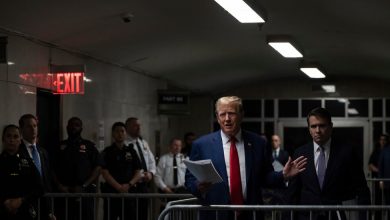Tammy Murphy, N.J.’s First Lady, Enters Crowded Race for Menendez’s Seat

Tammy Murphy, the wife of Gov. Philip D. Murphy of New Jersey, announced on Wednesday that she was running as a Democrat for the U.S. Senate seat now held by the state’s embattled senior senator, Robert Menendez, who has been charged with accepting bribes.
Ms. Murphy, 58, is a first-time candidate for public office who describes herself on tax forms as a homemaker.
During her husband’s six years as governor, she has been an active first lady who has worked to improve the state’s high rates of maternal and infant mortality and to expand instruction about climate change in public schools. Before she and Mr. Murphy married, 30 years ago, Ms. Murphy worked as a financial analyst, and she has since volunteered on nonprofit and philanthropic boards.
Ms. Murphy has been preparing for more than a month to run for the Senate, and she announced her candidacy on Wednesday with the release of a nearly four-minute video.
“We owe it to our kids to do better,” she says, speaking directly to the camera and presenting herself primarily as a mother of four who, when given the chance, used her platform as first lady to advocate for improved pregnancy outcomes.
“Right now, Washington is filled with too many people more interested in getting rich or getting on camera,” she says as a photo of Mr. Menendez flashes in the background, “than getting things done for you.”
Ms. Murphy already has at least two Democratic primary opponents: Representative Andy Kim, who has represented South Jersey in Congress since 2019, and Larry Hamm, a political activist and second-time Senate candidate who leads the People’s Organization for Progress. Patricia Campos-Medina, a left-leaning labor leader who runs the Worker Institute at Cornell University, said on Tuesday that she was also preparing to enter the race.
Mr. Menendez has pleaded not guilty to federal charges of bribery and plotting to be an agent of Egypt, and he has said that he will not resign from the Senate. He has not ruled out seeking re-election, but if he does compete for the Democratic nomination, he will face several practical challenges. A federal judge has scheduled his trial to start a month before the June primary, and he has been abandoned by nearly every leading Democrat in the state, including Mr. Murphy, leaving him an extremely difficult path to victory.
Mr. Menendez said Ms. Murphy’s entry into the race proved that the governor, who was among the first officials to call for his resignation, had a “personal, vested interest” in doing so.
“They believe they have to answer to nobody,” Mr. Menendez said about the Murphys in a written statement. “But I am confident that the people of New Jersey will push back against this blatant maneuver at disenfranchisement.”
Ms. Murphy, in Wednesday’s video, called her role as New Jersey’s first lady the “honor of my life.” But she has also earned a reputation as an aggressive campaign fund-raiser and now has seven months to introduce herself to voters as a candidate in her own right.
She is running as a Democrat for one of the most coveted political prizes in the country yet is a relative newcomer to the party. Voting records show she regularly voted in Republican primaries until 2014, three years before her husband was elected governor of a state where Democrats outnumber Republicans by nearly one million voters. Ms. Murphy continued to vote in Republican primaries even while Mr. Murphy served as finance chairman of the Democratic National Committee and as the ambassador to Germany, appointed by former President Barack Obama.
She declined an interview request, and her aides have refused to discuss her reasons for changing parties as a 49-year-old.
But Mr. Kim said Ms. Murphy’s voting history raised valid questions, particularly in a Democratic primary.
“I think she needs to explain that,” Mr. Kim, 41, said Monday in an interview.
Mr. Menendez also took a swipe at the first lady’s changed party affiliation.
“While Tammy Murphy was a card-carrying Republican for years,” he said, “I was working to elect Democrats up and down the ballot.”
Mr. Kim, a national security adviser during the Obama administration, entered the Senate race a day after Mr. Menendez and his wife, Nadine Menendez, were accused of accepting hundreds of thousands of dollars in bribes in exchange for the senator’s efforts to steer aid and weapons to Egypt and help allies avoid criminal prosecution.
Mr. Kim also released a campaign video this week, in which he is shown talking to a group of disenchanted voters.
“I believe that the opposite of democracy is apathy,” Mr. Kim, the father of 6- and 8-year-old boys, said to explain his motivation for running.
“I look at all the craziness in the world,” he said, adding, “I don’t want my kids to grow up in a broken America.”
Mr. Kim, who gained national prominence after being photographed clearing debris from the floor of the Capitol after the Jan. 6 attack, raised nearly $1 million in a single week after announcing his candidacy, and he said he was continuing to raise money at a brisk clip. To win, he will most likely need to capture the imaginations of voters without significant help from New Jersey’s Democratic Party leaders, who hold sway over the so-called county line — ballot placement that is often considered tantamount to victory.
New Jersey has a unique election system that enables county leaders from the Democratic and Republican parties to anoint candidates to run in a single column or row on primary ballots, an advantage that studies have shown increases their likelihood of victory by as much as 38 percentage points.
“It’s a rigged game,” said Julia Sass Rubin, an associate dean of the Edward J. Bloustein School of Public Policy at Rutgers University who has researched the influence of the county line in federal and legislative races. “There is no democracy in New Jersey.”
New Jersey’s Working Families Alliance and several former candidates have filed a federal lawsuit that they hope will lead a court to overturn the practice. “The election is almost over before it starts,” Brett Pugach, a lawyer who brought the federal suit, said about the ballot system, which he believes is fundamentally unconstitutional.
But in the meantime, the governor and Ms. Murphy have been busily courting Democratic leaders in the state’s heavily populated counties nearest New York City and Philadelphia, according to three people familiar with the conversations who did not want to be identified saying anything that could be considered critical of the governor. Several of those chairmen work as lobbyists with significant business before the state or hold lucrative state jobs, limiting the likelihood that they might openly oppose a governor with two years left in his term — and control over the next two multibillion-dollar state budgets.
That’s one of the reasons Ms. Campos-Medina, who emigrated from El Salvador as a 14-year-old, said she planned to run.
“The line disenfranchises women and, in particular, women of color and doesn’t encourage voter participation,” Ms. Campos-Medina, 50, said.
Whoever wins the Democratic primary will square off next November against a Republican hoping to break the Democrats’ four-decade Senate winning streak. There are at least two Republicans interested in vying for the nomination: Christine Serrano Glassner, the mayor of Mendham Borough, and Shirley Maia-Cusick, a member of the Federated Republican Women of Hunterdon County.
If one of the women is successful, she would make history as the first woman elected to the U.S. Senate from New Jersey.
Ms. Murphy would also be the first spouse of a sitting governor to be elected to the Senate in the United States. And she would also be likely to become the fifth member of New Jersey’s congressional delegation with relatives who have held prominent political positions, joining Representatives Tom Kean Jr., Rob Menendez Jr., Donald Norcross and Donald M. Payne Jr., all of whom are Democrats.
Ross K. Baker, a Rutgers University professor who has studied Congress for 50 years, said New Jersey’s county-line system contributed to what he called “political dynasties.”
“It’s fundamentally undemocratic,” Professor Baker said. “Politics shouldn’t be a family business.”




